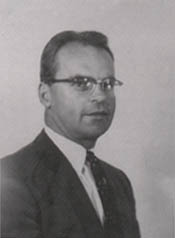James J. Martin
Profiles in History
Just over 30 years ago, James J. Martin, one of the most important and prolific revisionist historians of the twentieth century coined the term “Inconvenient History” with his collection of essays, The Saga of Hog Island. Long before Al Gore would speculate on the “Inconvenient Truth” of global warming, James Martin was already a veteran. Martin wrote:[1]
“What the late Harry Elmer Barnes described in detail over the years as the ‘historical blackout’ with respect to World War Two revisionism has been the fate of other historical diversions from accepted convention in other areas. A venerable ploy of the attackers of inconvenient history has been to ridicule the limited or often make-shift nature of its production, to decry its lack of pretentious supporters, or to launch sly, malicious innuendo against its producers, but avoiding if at all possible coming to terms with substance.”
James J. Martin was born on September 18, 1916. A trained historian, Martin graduated from the University of New Hampshire in 1942. He also studied at the University of Michigan, where he earned a Master’s degree in 1945, and a doctorate in history in 1949.[2]

While completing work on his dissertation, he received a mailing from the most prominent revisionist of the day, Harry Elmer Barnes. Barnes wrote to Martin just as he had written to graduate students and faculty in history departments all across the United States to advertise his latest booklet: Revisionism and the Historical Blackout. Intrigued by Barnes mailing, Martin ordered a copy. This momentous decision led to frequent written communication between the two men and the establishment of a friendship that would last for the rest of their lives.[3]
Martin was also well known in Libertarian circles. He wrote Men Against the State: The Expositors of Individualist Anarchism in America, in 1953. This volume gained widespread international respect. It focused on the philosophy and activities of anti-statist libertarian voluntarism in the United States from 1825 to 1910. Despite its success and acclaim, this dissertation turned out to be the last book he would ever write on intellectual history. Barnes writing and thought had a very powerful effect on him. As Martin became his close friend and protégé, he, like Barnes turned his attention to the two major wars of the 20th Century.[4]
Often identified as his most important work, American Liberalism and World Politics, 1931-1941, is a two-volume classic published in 1964 by Devin Adair. Murray Rothbard commented that these volumes reveal “the transformation of Liberal opinion from a policy of peace and neutrality to one of intervention and war – and from support of peaceful revision of the Versailles treaty to armed defense of the status quo it had imposed.”[5] Harry Elmer Barnes called this work “the most formidable achievement of World War II Revisionism.”[6]
Martin was also the author of three volumes of collected essays: Revisionist Viewpoints: Essays in a Dissident Historical Tradition, first published in 1971; The Saga of Hog Island and Other Essays in Inconvenient History, in 1977; and Beyond Pearl Harbor: Essays on Some Consequences of the Crisis in the Pacific in 1941, in 1983.
Martin became associated with the Institute of Historical Review throughout the 1980’s and became a member of the Editorial Advisory Board for their publication, The Journal of Historical Review. He spoke at several of the IHR’s annual revisionist conferences. His The Man Who Invented Genocide: The Public Career and Consequences of Raphael Lemkin, was published in 1984. This was Martin’s most significant work on the Holocaust. In this volume he analyzed the story of the evolution of the legal and political concept known as the “Genocide Convention” and its relation to the career and inventor of the word, Raphael Lemkin.
His final book, An American Adventure in Bookburning in the Style of 1918, released in 1989 addressed the American government’s attempts during World War I to prevent citizens from reading certain books about the war’s origins and conduct. Martin’s treatment certainly carries a warning for today as well as many books and articles are impacted by both outright censorship and the quiet censorship of what Barnes would call the “historical blackout.”
In all, Martin authored more than 200 articles, reviews, and essays, which appeared in dozens of periodicals. He contributed to the Encyclopaedia Britannica and was a three-time contributor to the Dictionary of American Biography. His teaching career spanned 25 years, included teaching posts at Northern Illinois University (DeKalb), San Francisco State College, Deep Springs College, and Rampart College.[7]
In an interview with Reason magazine in 1976, Martin described the relevance of revisionism:[8]
“Revisionism could be of relevance to almost anybody who’s interested in the record, who’s interested in some kind of faithful reproduction of events. In other words, my interest in this is not necessarily activated by ideological considerations. It’s more of a technical interest in getting the record straight.”
It is that interest that typified this rare scholar’s career and achievements. It is a standard that all historians should strive for. James J. Martin died on April 4, 2004, at age 87, at his home in Colorado Springs, Colorado.
Notes
| [1] | Martin, James J., The Saga of Hog Island and Other Essays in Inconvenient History, Ralph Myles, Colorado Springs, CO. 1977, p. xii. |
| [2] | Weber, Mark. “James J. Martin: The Passing of a Great Historian,” The Revisionist 2(2) (2004), p 216. |
| [3] | Riggenbach, Jeff., “James J. Martin: 1916 – 2004,” online: http://www.antiwar.com/orig/riggenbach.php?articleid=2593 |
| [4] | Ibid. |
| [5] | Martin, James J., American Liberalism and World Politics, 1931-1941, Devin-Adair, New York, 1964, back cover. |
| [6] | Ibid. |
| [7] | Weber, p. 216. |
| [8] | “Introducing Revisionism: An Interview with James J. Martin,” online: http://tmh.floonet.net/articles/revintro.html |
Bibliographic information about this document: Inconvenient History, vol. 1, no. 1 (summer 2009)
Other contributors to this document: n/a
Editor’s comments: n/a
